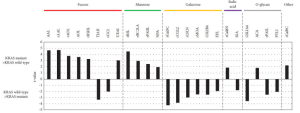Changes in glycosylation in Pancreatic Ductal Adenocarcinoma mediated by KRAS mutations
A group from Department of Gastrointestinal and Hepato-Biliary-Pancreatic Surgery, Faculty of Medicine, University of Tsukuba, Japan, etc. has reported about changes in glycosylation in Pancreatic Ductal Adenocarcinoma mediated by KRAS gene mutations.
https://www.ncbi.nlm.nih.gov/pmc/articles/PMC10963106/
It was shown that Fucosilation and mannosylation were upregurated in pancreatin ductal adenocarcinoma with KRAS gene mutations.
The lectins enriched in KRAS mutants included fucose-binding lectins (AAL, rAAL, AOL, rAOL, rRSIIL, and UEAI) and mannose-binding lectins (rRSL, rBC2LCA, rPAIIL, and NPA).


 <a?
<a?